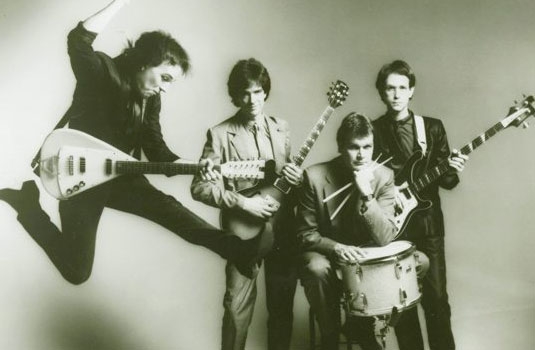The Spongetones
The early Beatles reborn, or an incredible simulation?
Taking inspiration from the Fab Four, Charlotte, North Carolina’s phenomenal pop combo The Spongetones have delighted discerning pop fans with avowedly Beatlesque hooks and harmonies. The group’s earliest efforts are engaging pastiches of Beatles ’65–much like The Rutles played straight–with each tune a familiar-sounding rummage through the British Invasion songbook. The appeal transcends mere mimicry; its magic lies not in where the group nicked its initial tricks, but in the self-assured manner in which such thefts became irresistible new pop confections. The greatness of The Spongetones has always been their ability to make all of this their own.
Now yesterday and today our theater’s been jammed with newspapermen and hundreds of photographers from all over the nation, and these veterans agreed with me that the city has never witnessed the excitement stirred by these youngsters from Liverpool who call themselves The Beatles. Now tonight you’re going to twice be entertained by them; right now, and in the second half of our show. Ladies and gentlemen, THE BEATLES!
I can’t say for sure that Jamie Hoover, Steve Stoeckel, Pat Walters, and Rob Thorne–the four young lads who would one day form The Spongetones–were all sprawled in front of black and white TV sets on the evening of February 9th, 1964, eagerly awaiting ol’ Stoneface Ed Sullivan‘s special guests The Beatles. But I betcha they were. They must have been. Because in America, that’s where everything we call power pop started. It’s not that The Beatles were the first great rock ‘n’ roll act; they were preceded by their own greatest influences, by Chuck Berry and Little Richard, Buddy Holly, Arthur Alexander, The Everly Brothers, Carl Perkins, Larry Williams, Jerry Lee Lewis, Motown, The Shirelles, and King Elvis I, plus those California guys The Beach Boys. But pop mania? The notion that the kids could make a noise heard ’round the world? The Beatles weren’t the first there either, but they were the ones that made it permanent, unstoppable. In 1979, a decade and a half after The Beatles reclaimed the colonies for Her Majesty, that unstoppable mop-topped juggernaut begat The Spongetones.
The Beatles were a product of everything around them, their sound shaped by every imported American 45 they heard and every tinny AM signal they tried to tune in. The same was true of their followers, and it was certainly true of The Spongetones. The Spongetones listened to The Beatles, The Byrds, The Hollies, The Dave Clark Five, and every other pop sound that ever mattered. They listened. They learned. They created. They called their first album Beat Music as if anyone could mistake their Mersey-bred goals for something else, for anything other than an early clue to the new direction. After their first album and EP, they began to leave overt Beatlemania behind, but they have continued to make stirring, timeless pop records that distill and expand upon the inspiration provided by the fabbest of sparks. Hoover, Stoeckel, and Walters are still Spongetones, with Chris Garges taking over the drummer’s seat. All together now!
Yeah (yeah yeah), all the Beatle references are fun and fitting. But don’t let the repeated reference fool you into thinking The Spongetones are anything less than what they are and always have been: one of the greatest groups that power pop has ever produced. The Spongetones’ music is a treasure to be savored, an enduring pleasure, a splendid time guaranteed for all. I’m sure they would be flattered by a comparison to The Beatles; they deserve to be recognized for their own ongoing, nonpareil contributions to this music we adore. From Beat Music through Scrambled Eggs, “She Goes Out With Everybody” through “Talking Around It,” with tracks like “(My Girl) Maryanne,” “Anna,” “Are You Gonna, Do You Need To (Love Me),” “Better Luck Next Time,” “You’ll Come Runnin’ Back,” and “Anyway Town” among the many gems perched proudly in between, The Spongetones’ music is just, well, their music. Today, The Spongetones finally take their well-earned place in The Power Pop Hall Of Fame. And you know that can’t be bad.
(Source: Carl Cafarelli)





